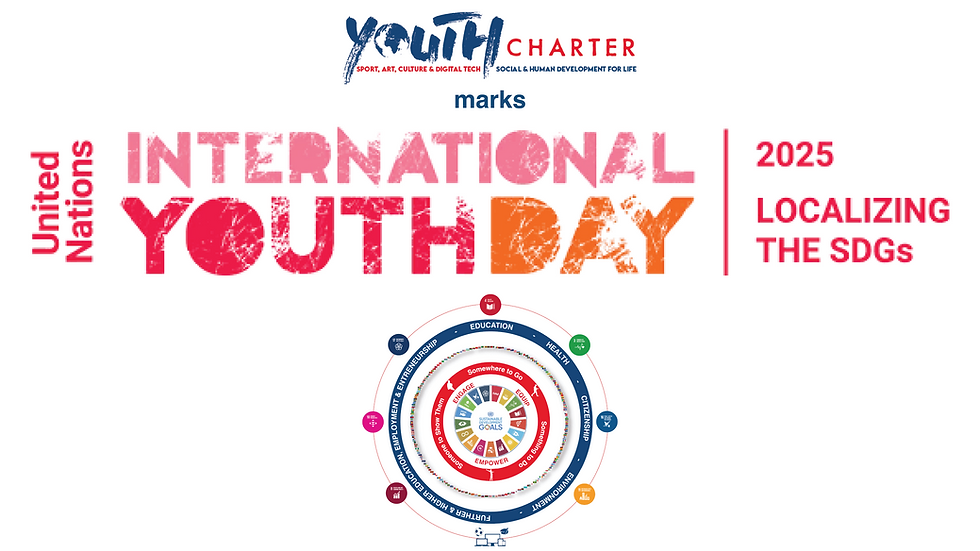From Rhetoric to Reality: A Global Call to Action for Sport for Development and Peace to Achieve the 2030 Goals
- Aug 12, 2025
- 4 min read

"Sport has the power to change the world.
It has the power to inspire.
It has the power to unite people in a way that little else does."
Nelson Mandela
The 2030 Deadline Is Approaching
With just five years remaining before the 2030 deadline for the United Nations Sustainable Development Goals (SDGs), the global community stands at a crossroads. Progress has been uneven. The promise of inclusive education, gender equality, peaceful and safe communities, climate action, and decent work for all remains unfulfilled for millions of young people – especially those in marginalised and conflict-affected communities.
The Sport for Development and Peace (SDP) movement has, over the last three decades, demonstrated its power to address these challenges. From the playgrounds of post-apartheid South Africa to community pitches in inner-city Manchester, sport has been a catalyst for change – engaging, equipping, and empowering youth to transform their lives.
But today, the movement faces a new test:
Will we mobilise collectively, authentically, and with evidence of impact to deliver the SDGs by 2030?
The Youth Charter’s Global Call to Action
In 1993, the Youth Charter was founded in Manchester following the tragic loss of a young life to gun violence. Born out of grief but driven by hope, we launched a mission to use sport, art, culture, and digital activity as vehicles for peace, opportunity, and social change.
Over 32 years, our work has spanned continents and causes:
Youth empowerment in deprived UK communities through Community Campuses and Social Coach Leadership Programmes.
Gender equality initiatives that have created pathways for young women into sport, leadership, and employment.
Post-conflict recovery projects from Johannesburg to Islamabad, using sport to rebuild trust, social cohesion, and opportunity.
Climate-conscious campuses integrating environmental sustainability into youth programmes.
In 2019, we crystallised these efforts into a Global Call 2 Action with the rallying cry: #LegacyOpportunity4All.
This call demands that sport is recognised not as an optional extra, but as an essential driver of the SDGs – and that we move from symbolic gestures to sustained, funded, and measurable action.
From Gesture to Genuine Impact
The SDP movement has often been rich in ideals but inconsistent in delivery. Too often, high-level declarations at UN summits or Olympic congresses fail to translate into action at the grassroots.
Our Call to Action sets out three urgent priorities:
Mobilise a Global SDP Fund - A dedicated, transparently managed fund – resourced by governments, sport bodies, private sector, and philanthropists – to invest in community-led projects that directly address SDG targets.
Empower Authentic Leadership at All Levels - Support social coaches, teachers, youth workers, and peer mentors – those trusted by young people – with training, resources, and recognition.
Embed Evidence and Accountability - Every initiative must be monitored and evaluated against SDG-aligned indicators – not just counting participants, but measuring improvements in education, health, gender equity, peacebuilding, and climate action.
The Evidence of Sport’s Contribution to the SDGs
Across the Youth Charter’s 32-year journey, we have seen measurable contributions to multiple SDGs:
SDG 3 (Good Health & Well-Being): Physical activity programmes reducing childhood obesity, improving mental health, and increasing life expectancy in deprived areas.
SDG 4 (Quality Education): After-school sport-linked tutoring improving school attendance and attainment.
SDG 5 (Gender Equality): Female football leagues and leadership training creating role models for young girls.
SDG 8 (Decent Work & Economic Growth): Coaching qualifications and event volunteering leading to employment and entrepreneurship.
SDG 11 (Sustainable Cities & Communities): Community Campuses revitalising urban spaces and reducing crime.
SDG 16 (Peace, Justice & Strong Institutions): Sport-based interventions in high-violence areas reducing anti-social behaviour and building trust in local governance.
SDG 17 (Partnerships for the Goals): Cross-sector alliances uniting sport federations, government agencies, NGOs, and the private sector.
This is not theory. This is evidence, documented in project evaluations, parliamentary submissions, and independent studies.
A Call for a Truly Collective Effort
On this International Youth Day, we call on the global community to unite behind a renewed Sport for Development and Peace Compact:
Governments: Integrate SDP into national development strategies and youth policies, with clear budget lines and outcome targets.
International Institutions: The UN, IOC, Commonwealth, African Union, and others must coordinate efforts, share data, and align on a common impact framework.
Private Sector & Philanthropy: Invest in grassroots sport not as charity, but as strategic social impact with measurable returns.
Youth Leaders: Take ownership of the movement – design, lead, and evaluate projects that respond to your community’s needs.
Research & Academia: Provide robust monitoring, evaluation, and learning to ensure interventions are cost-effective and scalable.
Conclusion: From Taking a Knee to Taking a Stand
As we approach 2030, there is no time left for rhetoric without action. We must go beyond symbolic acts and deliver real, evidence-based change.
The Youth Charter’s Global Call to Action is an open invitation to all – from Olympic champions to local volunteers, agencies and organisations in the sport for development eco-system to take a stand for young people and for a peaceful, prosperous, and sustainable world.
The playing field is the world. The prize is a generation of young people who can be engaged, equipped and empowered to live free from poverty, violence, and hopelessness and build the future they can thrive and flourish in.
On this International Youth Day, let us commit:
From every street to every stadium and every community, we will make the next five years count.

Professor Geoff Thompson MBE FRSA DL,
Founder & Chair,
Youth Charter





Comments